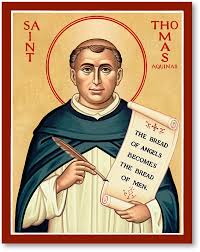HOMILY WEEK 03 05 – Year II
Faith Like A Mustard Seed:
Memorial of St. Thomas Aquinas
(2 Sam 11:1-17; Ps 51; Mk 4:26-34)
*************************************
The Gospel for today features the parable of the mustard seed. Bishop Robert Barron starts us off with this reflection:
How does God tend to work? From the very small to the very great—and by a slow, gradual process. God tends to operate under the radar, on the edges of things, quietly, clandestinely, not drawing attention to himself.
C.S. Lewis speaks to this principle. How, he asks, did God enter history? Quietly, in a forgotten corner of the Roman Empire, sneaking behind enemy lines. How was European Christianity established? Through the handful of people that listened to St. Paul in Philippi and Athens. How did the mighty Franciscan movement come to be? One odd, mystical kid who heard a voice coming from a crucifix: “Francis, rebuild my church, which is falling into ruin.” A handful of followers joined him in his quixotic project, then dozens, then hundreds, then thousands.
So don’t be afraid to do small things at the prompting of God! Plant the seed, make the move, take the risk—take even the smallest step, and don’t worry about who notices or how much attention you’re getting. Sow the seed and leave the rest to the mercy and providence of God.
To his reflection I add one of my own on the first reading today that recounts the familiar story of the sin of David – basically lust, adultery and arranging a murder. Certainly, shocking for anyone, but especially a king whose troops are defending his nation, and who is supposed to care for all his people.
The point of this whole story, the underlining of the seriousness of David’s transgressions, is to underline in its turn the magnanimity and greatness of God’s compassion and unconditional love, which we will see David experiences when confronted by the prophet. It is that experience of God’s mercy through forgiveness, and David’s sincere, heartfelt repentance, which transforms David into the only true King Israel ever had. That also sets up the stage for the transformation in the New Testament of both Saints Peter and Paul into who they were – also through forgiveness. That should give us encouragement to allow God to do the same in our lives, whatever our past sins and mistakes have been.
 Today the church honors St. Thomas Aquinas, who had one of the greatest minds in the history of the Church. He was born near Aquino, Italy, about 1225. From an early age he posed questions of great theological depth; his family sent him at the age of five to be educated by the Benedictines in Monte Cassino. His teacher, Albert the Great, proclaimed his teaching would one day be heard throughout the world, which is precisely what happened.
Today the church honors St. Thomas Aquinas, who had one of the greatest minds in the history of the Church. He was born near Aquino, Italy, about 1225. From an early age he posed questions of great theological depth; his family sent him at the age of five to be educated by the Benedictines in Monte Cassino. His teacher, Albert the Great, proclaimed his teaching would one day be heard throughout the world, which is precisely what happened.
With Albert, he developed the theological Scholastic method which dominated Catholic teaching for centuries. A prodigious writer, his most famous work is the Summa Theologica, one of the greatest examples of theological thought ever composed. Many of his hymn texts, such as Pange lingua, Tantum ergo and Adore te devote, are still used today. A man of towering intellect, Thomas was also a humble mystic. He died in 1274, was canonized in 1323, and declared a Doctor of the Church in 1567. In 1880, he was proclaimed a patron saint of universities and schools.
Thomas was able to plant a seed of truth-seeking that enable the works of the greatest philosopher of ancient times, the pagan Aristotle, to become accepted in the Western Christian world, even though that work was coming mostly form Muslim sources. His simple principle was that truth does not contradict truth, so if the teachings of Aristotle rang true to Christian belief, then they must be true and acceptable.
The Eucharist is both a present experience of God’s mercy as forgiveness and healing, and also an experience of the mustard seed in our own lives – an act of faith that will transform us into followers of Jesus like St. Thomas Aquinas.



